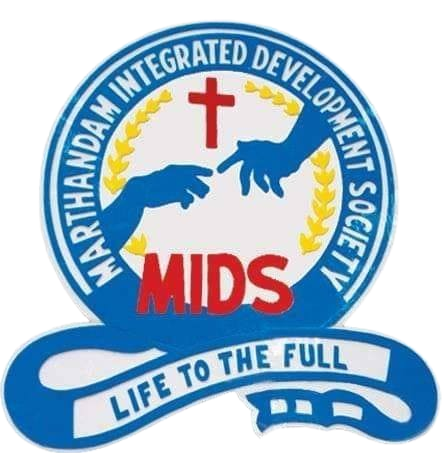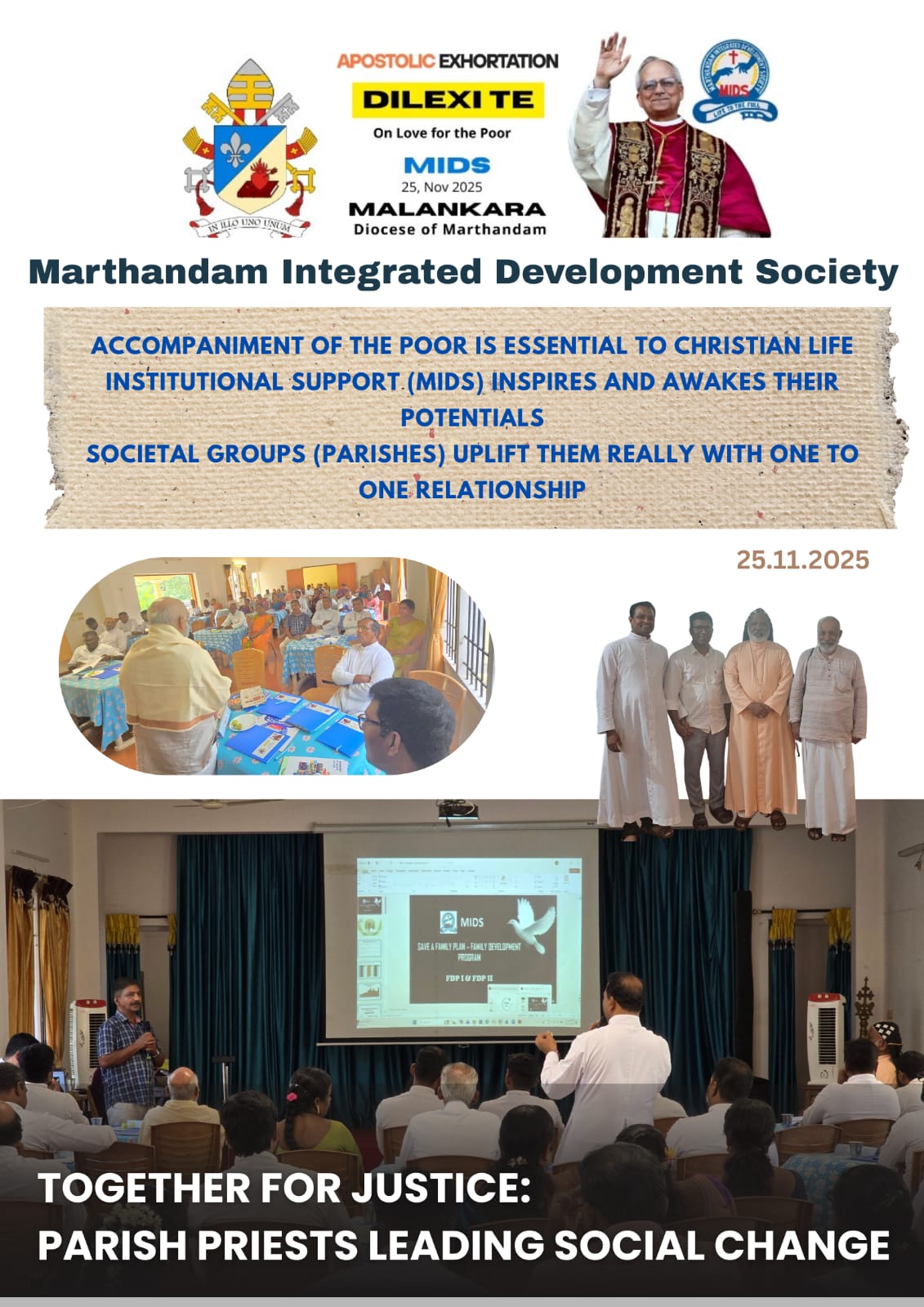
Dilexi te
A special consultation programme brought together our Bishop, 40+ priests, and MIDS staff to reflect on our shared social mission. Together, we discussed how parishes and MIDS can better serve the poor with compassion and action. A step forward in strengthening our commitment to justice, care, and community upliftment.
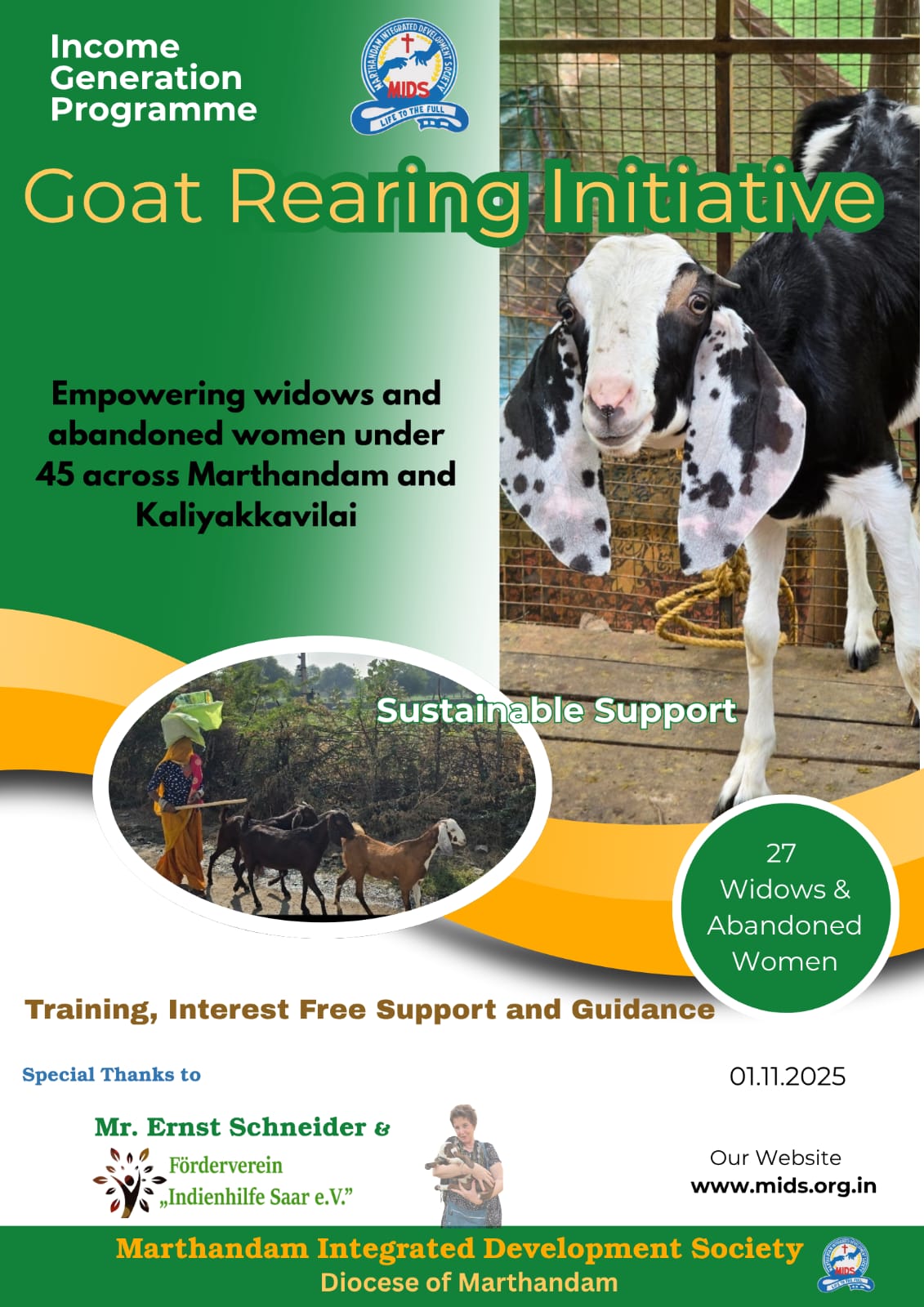
Goat Rearing Initiative
Goat Rearing for Progress is an income-generation initiative dedicated to strengthening the livelihoods of economically disadvantaged families in the Diocese of Marthandam. Through this humanitarian programme, 27 widows and abandoned women have been identified and supported with training, livestock assistance, and continuous capacity-building guidance. The initiative aims to empower vulnerable women to achieve financial independence, rebuild dignity, and lead a stable and fulfilling life. By promoting sustainable rural livelihoods, the programme contributes to long-term socio-economic resilience and uplifts families toward a future of self-reliance and hope.
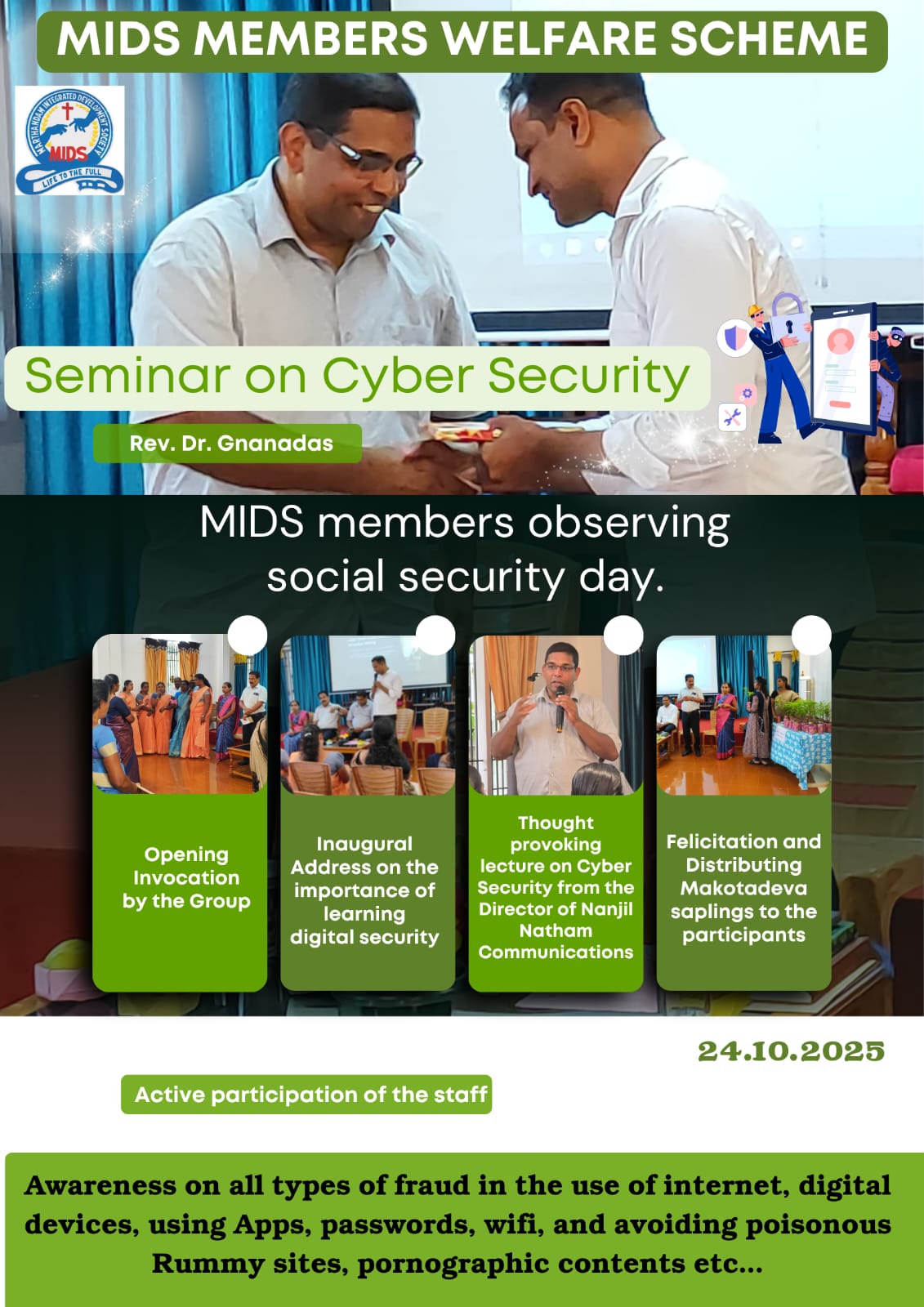
MMWS Social Security Day
MIDS Social Security Day MIDS observed Social Security Day with a comprehensive awareness initiative focused on promoting safe and ethical digital practices among MIDS staff members.The session addressed the growing risks associated with internet misuse and digital exploitation, emphasizing proactive safety measures to ensure a secure online environment for all. Key topics covered included: Responsible and safe use of smartphones, computers, and internet services Identifying and preventing online fraud, cyber threats, and phishing scams Safe handling of passwords, OTPs, banking information, and personal data Dangers of unsafe public Wi-Fi networks and unverified applications Protection against cyber addiction, inappropriate digital content, and predatory online platforms, including illegal gaming and harmful adult websites. The program highlighted the importance of digital literacy for social well-being, especially for vulnerable groups such as youth and digitally-new users. Through interactive discussions and real-life case examples, MIDS staff gained practical knowledge to safeguard themselves and their families in an increasingly technology-driven world.
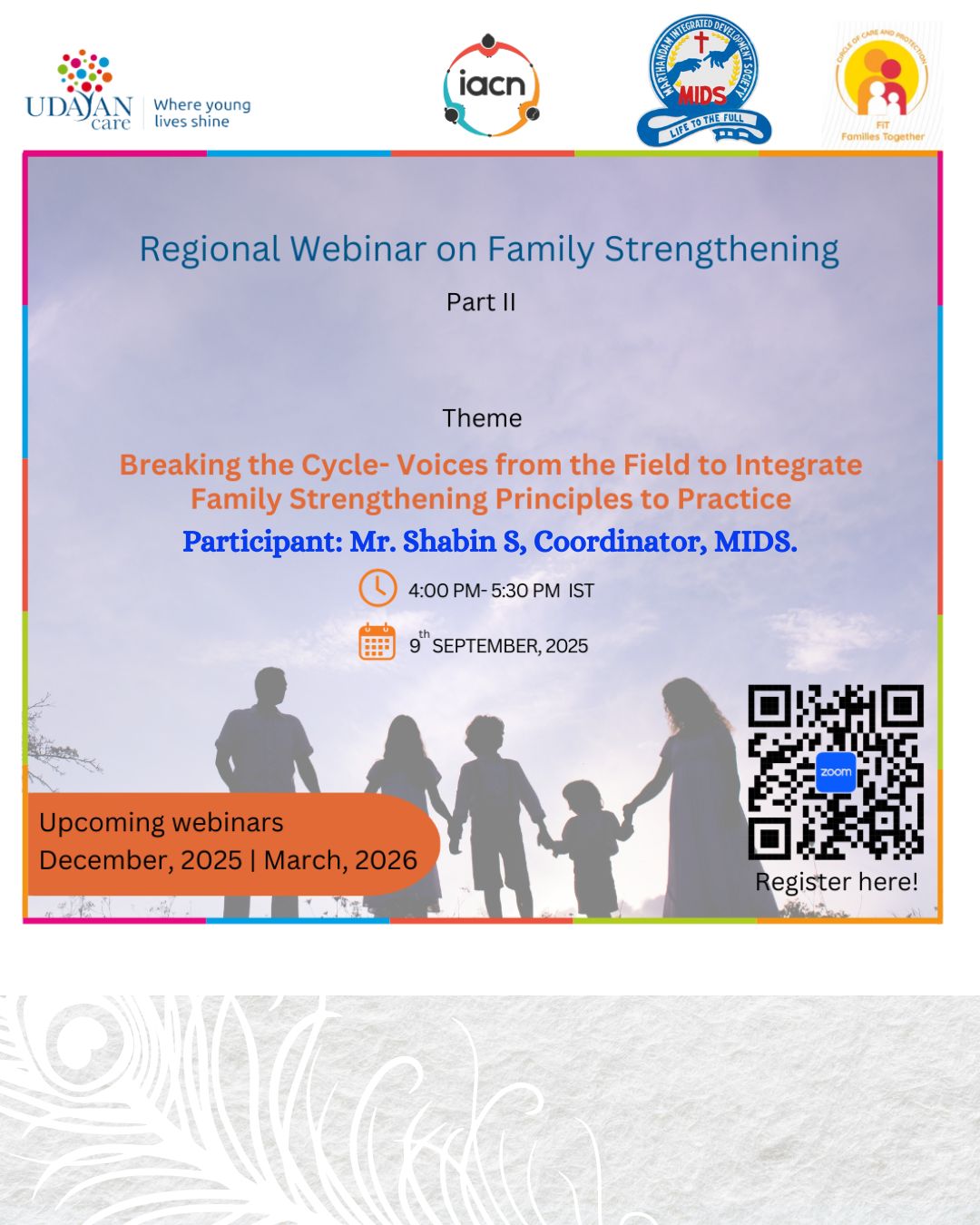
Breaking the Cycle- Voices from the Field to Integrate Family Strengthening Principles to Practice
MIDS participated in the regional webinar called “Breaking the Cycle – Voices from the Field to Integrate Family Strengthening Principles to Practice.” on 9/9/2025. The session highlighted best practices and lived experiences from the Western and Central regions of India, with a strong focus on the role of families and communities in preventing child–family separation. Participants had the opportunity to learn about innovative family strengthening practices, the challenges faced by communities, and the critical gaps that need to be addressed to ensure children grow in safe and nurturing environments. One of the best practices presented was the work of the Family Service Centre (FSC) in Mumbai, a civil society organization established in 1955. FSC has pioneered alternative family care and community outreach programs, supporting families through adoption, educational sponsorship, temporary family care, counseling, and empowerment initiatives. Each year, their educational sponsorship program reaches over 450 children and families, while the temporary family care initiative, supported by the Maharashtra State Government, provides an alternative to institutional care for children in crisis. In addition, their community interventions focus on education, health, livelihood, and capacity building for children, women, and youth, helping families to build resilience and stability. Another significant model discussed was the Safe City Program in Bhopal, a UNICEF-supported initiative implemented with local partners to strengthen child protection networks at the ward level, build local mechanisms, and enhance children’s agency. This program follows a people-centric approach, offering flexible responses to vulnerable communities such as Vimukta tribes, urban Adivasi groups, and children of single or no parents. The discussions also shed light on common challenges, including lack of awareness among families, complex family dynamics such as addiction and instability, frequent migration, documentation barriers, coordination gaps between NGOs and government bodies, and shortage of trained social workers. While laws in India prioritize family-based care, translating this into ground-level practice requires time, trust, and significant resources. The way forward identified during the webinar included regular community sensitization sessions, stronger multi-stakeholder collaboration, holistic models that integrate psychosocial, legal, financial, health, and educational support, and continuous capacity building of frontline workers. Overall, the webinar was a powerful reminder that each child deserves to grow up in a family environment. Families and communities, even when fragile, can become resilient when supported with the right interventions. The learnings encourage us to look beyond institutional solutions and instead focus on empowering families as the true foundation of child protection and holistic development.
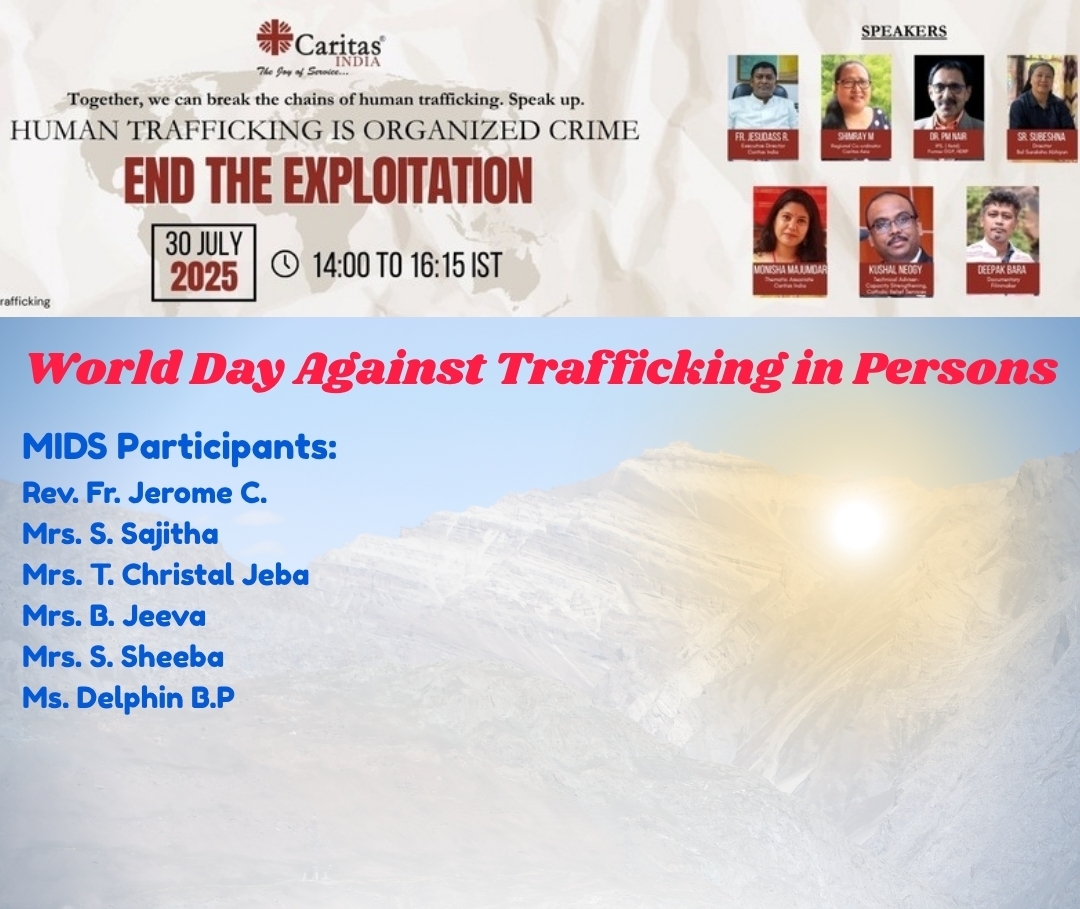
World Day Against Trafficking in Persons
On July 30, 2025, to mark the World Day Against Trafficking in Persons, six of our MIDS team members including our Director Rev. Fr. Jerome C. participated in a powerful and eye-opening webinar organized by Caritas India titled “Human Trafficking is Organized Crime – End the Exploitation.” Over 90 participants from around the world joined this session, making it a truly global dialogue on one of the most pressing challenges. The session focused on how disasters such as earthquakes, floods, and pandemics often create the perfect environment for trafficking networks to exploit vulnerable populations. It was highlighted that during these times, when families are displaced, institutions are weakened, and law enforcement is diverted, traffickers prey on the most vulnerable especially children, women, migrants, and economically poor families. The speakers presented real examples, such as the Nepal Earthquake in 2015 and Cyclone Amphan in 2020, to show the rise in trafficking incidents following major disasters. The session also covered key indicators of trafficking, such as lack of access to personal documents, visible signs of abuse, and restricted communication. Participants learned about the importance of including anti-trafficking measures in disaster response plans, setting up safe spaces, training frontline workers, creating multilingual helplines, and promoting women’s livelihoods to reduce vulnerability. NGOs were recognized as having a critical role in prevention and protection, especially in creating child-friendly spaces and supporting survivors. The session also touched on emerging trends like online trafficking, fake skill training centers, and exploitation through IVF and egg donation scams. It further addressed the real challenges in rescue and rehabilitation, such as delayed FIRs, family pressure, poor shelter facilities, and lengthy legal procedures. The webinar concluded with a strong call for collaborative action to protect migrants’ rights, embed anti-trafficking systems into disaster response, and ensure survivors receive ongoing mental health, legal, and economic support. This learning experience has significantly strengthened MIDS to advocate for justice, safety, and dignity for all, especially the most vulnerable among us.
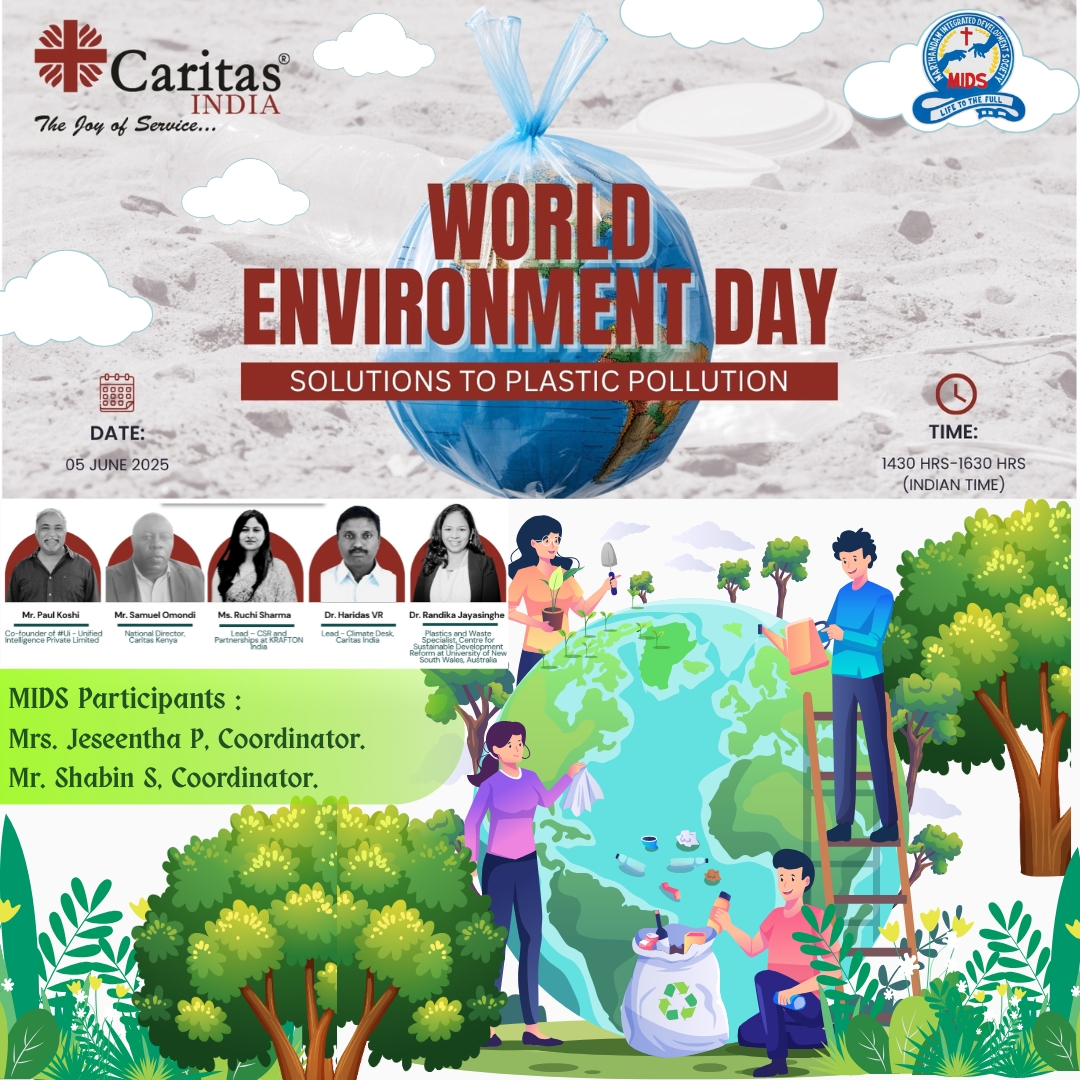
World Environment Day 2025
World Environment Day 2025 Theme: Solutions to Plastic Pollution Date: 5th June 2025 Time: 2:30 PM – 4:30 PM (IST) Organized by: Caritas India In observance of World Environment Day 2025, Caritas India hosted a powerful webinar on “Solutions to Plastic Pollution”, bringing together a diverse group of thought leaders, innovators, and activists committed to reimagining plastic waste as a resource for sustainability and social change. Over 100 participants from around the world joined this session, making it a truly global dialogue on one of the most pressing environmental challenges. Representatives from Marthandam Integrated Development Society (MIDS) Mrs. Jeseentha and Mr. Shabin, coordinators actively participated in this insightful session and gained valuable new insights. Speaker Highlights: Mr. Paul Koshi – Co-founder, Unified Intelligence Pvt Ltd Topic: Waste = Untapped Wealth Mr. Koshi showcased how discarded plastic wrappers from the food industry can be transformed into eco-friendly construction blocks. These blocks are waterproof, thermally insulated, earthquake-resistant, and used in classrooms, houses, and cold storage units for farmers. His innovation exemplifies how plastic waste can be repurposed into sustainable infrastructure materials that are both cost-effective and environmentally responsible. Mr. Samuel Omondi – National Director, Caritas Kenya Topic: Plastic Pollution Control: Kenya’s Experience Mr. Omondi shared Kenya’s pioneering efforts in banning plastic bags and implementing PET recycling initiatives. Despite early resistance, policy changes and legal amendments led to one of the world’s strictest plastic bag bans. He emphasized that policy enforcement, public awareness, and political will are critical to sustained impact in plastic waste reduction. Ms. Ruchi Sharma – Lead – CSR and Partnerships, KRAFTON India Topic: Plastic-Free Communities: Driving Change through CSR, Partnerships & People Power Ms. Sharma emphasized community participation and the role of CSR in enabling systemic change. She advocated for partnerships among NGOs, citizens, and government bodies to build plastic-free communities. Her message centered on trust, empowerment, and the need for grassroots, volunteer-led movements to shift from short-term cleanups to long-term solutions. Dr. Haridas – Environmental Health Expert Topic: Invisible Threat: Microplastics’ Impact Dr. Haridas drew attention to the pervasive presence of microplastics in our food, water, and environment. From plastic water tanks to seafood, he highlighted the health risks posed by these invisible particles. He recommended practical steps like avoiding shellfish, not microwaving food in plastic, and drinking filtered water to reduce exposure. Dr. Randika Jayasinghe – Environmental Scientist Topic: From Waste to Wealth: Building Sustainable Livelihoods Through Plastic Innovations Dr. Jayasinghe shared inspiring stories of upcycling plastic waste into useful products-shoes, furniture, building materials, and even roads. She called for source segregation, energy recovery from non-recyclables, and product design focused on recyclability. Her message reinforced how innovation can turn plastic pollution into economic opportunities, especially for marginalized communities. This webinar served as a rich learning platform, demonstrating that plastic pollution is not just an environmental issue, but a social and economic challenge and that the solutions must be collaborative, inclusive, and innovative. MIDS is committed to incorporating these insights into our ongoing work for environmental sustainability and community empowerment.
